many more 与 much more 的区别
much和many的用法
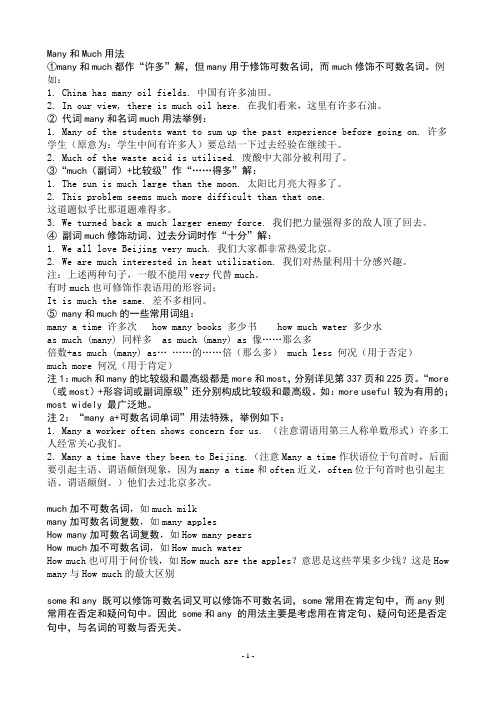
Many和Much用法①many和much都作“许多”解,但many用于修饰可数名词,而much修饰不可数名词。
例如:1. China has many oil fields. 中国有许多油田。
2. In our view, there is much oil here. 在我们看来,这里有许多石油。
②代词many和名词much用法举例:1. Many of the students want to sum up the past experience before going on. 许多学生(原意为:学生中间有许多人)要总结一下过去经验在继续干。
2. Much of the waste acid is utilized. 废酸中大部分被利用了。
③“much(副词)+比较级”作“……得多”解:1. The sun is much large than the moon. 太阳比月亮大得多了。
2. This problem seems much more difficult than that one.这道题似乎比那道题难得多。
3. We turned back a much larger enemy force. 我们把力量强得多的敌人顶了回去。
④副词much修饰动词、过去分词时作“十分”解:1. We all love Beijing very much. 我们大家都非常热爱北京。
2. We are much interested in heat utilization. 我们对热量利用十分感兴趣。
注:上述两种句子,一般不能用very代替much。
有时much也可修饰作表语用的形容词:It is much the same. 差不多相同。
⑤ many和much的一些常用词组:many a time 许多次 how many books 多少书 how much water 多少水as much (many) 同样多 as much (many) as 像……那么多倍数+as much (many) as………的……倍(那么多) much less 何况(用于否定)much more 何况(用于肯定)注1:much和many的比较级和最高级都是more和most,分别详见第337页和225页。
much和many的区别及用法

much和many的区别及用法
两者都表示“许多”,但many 修饰或代替可数名词(复数),与few(少数)相对;而much 用来修饰或代替不可数名词(单数),与little(少量)相对。
1much 和many 的区别是什幺1. 两者都表示“许多”,但many 修饰或代替
可数名词(复数),与few(少数)相对;而much 用来修饰或代替不可数名词(单数),与little(少量)相对。
如:
Did you see many people there?
你在那儿看见许多人了吗?
Many poets have died young.
许多诗人很年轻就死了。
Do you have much money left?
你剩的钱多吗?
He doesn’t spend much time preparing his lessons.
他备课不花太多时间。
2. 关于many of 和much of:
(1) 其后接名词时,该名词通常应是特指的(比如有the, these, those, my, our, Tom’s等修饰)。
如:
Many of the farmers grow rice.
很多农民种稻子。
much和many的用法
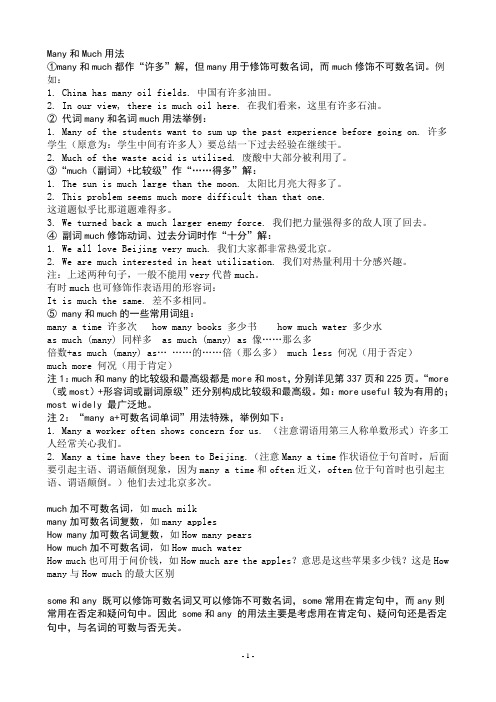
Many和Much用法①many和much都作“许多”解,但many用于修饰可数名词,而much修饰不可数名词。
例如:1. China has many oil fields. 中国有许多油田。
2. In our view, there is much oil here. 在我们看来,这里有许多石油。
②代词many和名词much用法举例:1. Many of the students want to sum up the past experience before going on. 许多学生(原意为:学生中间有许多人)要总结一下过去经验在继续干。
2. Much of the waste acid is utilized. 废酸中大部分被利用了。
③“much(副词)+比较级”作“……得多”解:1. The sun is much large than the moon. 太阳比月亮大得多了。
2. This problem seems much more difficult than that one.这道题似乎比那道题难得多。
3. We turned back a much larger enemy force. 我们把力量强得多的敌人顶了回去。
④副词much修饰动词、过去分词时作“十分”解:1. We all love Beijing very much. 我们大家都非常热爱北京。
2. We are much interested in heat utilization. 我们对热量利用十分感兴趣。
注:上述两种句子,一般不能用very代替much。
有时much也可修饰作表语用的形容词:It is much the same. 差不多相同。
⑤ many和much的一些常用词组:many a time 许多次 how many books 多少书 how much water 多少水as much (many) 同样多 as much (many) as 像……那么多倍数+as much (many) as………的……倍(那么多) much less 何况(用于否定)much more 何况(用于肯定)注1:much和many的比较级和最高级都是more和most,分别详见第337页和225页。
much和many的用法
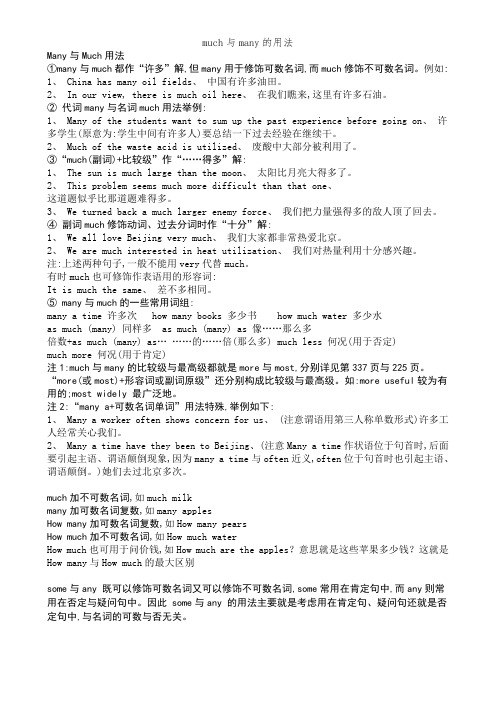
Many与Much用法①many与much都作“许多”解,但many用于修饰可数名词,而much修饰不可数名词。
例如:1、 China has many oil fields、中国有许多油田。
2、 In our view, there is much oil here、在我们瞧来,这里有许多石油。
②代词many与名词much用法举例:1、 Many of the students want to sum up the past experience before going on、许多学生(原意为:学生中间有许多人)要总结一下过去经验在继续干。
2、 Much of the waste acid is utilized、废酸中大部分被利用了。
③“much(副词)+比较级”作“……得多”解:1、 The sun is much large than the moon、太阳比月亮大得多了。
2、 This problem seems much more difficult than that one、这道题似乎比那道题难得多。
3、 We turned back a much larger enemy force、我们把力量强得多的敌人顶了回去。
④副词much修饰动词、过去分词时作“十分”解:1、 We all love Beijing very much、我们大家都非常热爱北京。
2、 We are much interested in heat utilization、我们对热量利用十分感兴趣。
注:上述两种句子,一般不能用very代替much。
有时much也可修饰作表语用的形容词:It is much the same、差不多相同。
⑤ many与much的一些常用词组:many a time 许多次 how many books 多少书 how much water 多少水as much (many) 同样多 as much (many) as 像……那么多倍数+as much (many) as………的……倍(那么多) much less 何况(用于否定)much more 何况(用于肯定)注1:much与many的比较级与最高级都就是more与most,分别详见第337页与225页。
关于much.some.many.any.more.a lot of.a little.plenty of.e few.之间的区别
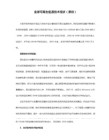
a lot of, 相当于much,more的化身,但仅用于修饰名词,当后面接形容词比较级时,应为a lot;例:
There is a lot of water in the tank; There'are a lot of books in my room; I'm a lot better now, thanks.
more, 为much和many的比较级,后接名词(可数或不可数均可),或形容词;例:
I have more books than him. I have more coffee than him; The book is more expensive.
想必你是新学,可以多看几个例句,理解一下。
希望有所帮助。参考资料:Mark is no second.
plenty of稍微复杂一点,用于口语表达时修饰不可数名词的程度而非数量多一些,但它也可以修饰可数名词,只是情况稍少些;
a little, a few就没什么好说了吧,"一些",分别接不可数、形容词和可数名词~例:
I have a little money; I'm a little hungry; I have a few books。
much,many,表示很多,前者用于形容词比较级及不可数名词,后者用于修饰可数名词;例:
It's much easier now; There're much watห้องสมุดไป่ตู้r in the tank; I have many books;
much和many的用法
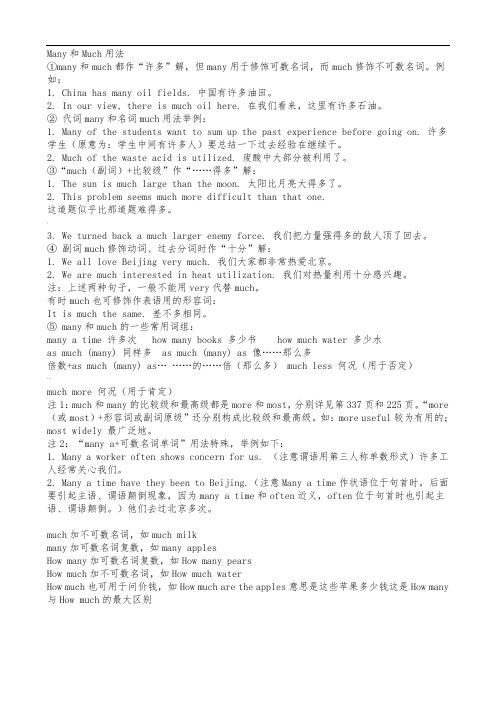
Many和Much用法①many和much都作“许多”解,但many用于修饰可数名词,而much修饰不可数名词。
例如:1. China has many oil fields. 中国有许多油田。
2. In our view, there is much oil here. 在我们看来,这里有许多石油。
②代词many和名词much用法举例:1. Many of the students want to sum up the past experience before going on. 许多学生(原意为:学生中间有许多人)要总结一下过去经验在继续干。
2. Much of the waste acid is utilized. 废酸中大部分被利用了。
③“much(副词)+比较级”作“……得多”解:1. The sun is much large than the moon. 太阳比月亮大得多了。
2. This problem seems much more difficult than that one.这道题似乎比那道题难得多。
:3. We turned back a much larger enemy force. 我们把力量强得多的敌人顶了回去。
④副词much修饰动词、过去分词时作“十分”解:1. We all love Beijing very much. 我们大家都非常热爱北京。
2. We are much interested in heat utilization. 我们对热量利用十分感兴趣。
注:上述两种句子,一般不能用very代替much。
有时much也可修饰作表语用的形容词:It is much the same. 差不多相同。
⑤ many和much的一些常用词组:many a time 许多次 how many books 多少书 how much water 多少水as much (many) 同样多 as much (many) as 像……那么多倍数+as much (many) as………的……倍(那么多) much less 何况(用于否定)…much more 何况(用于肯定)注1:much和many的比较级和最高级都是more和most,分别详见第337页和225页。
much和many的用法
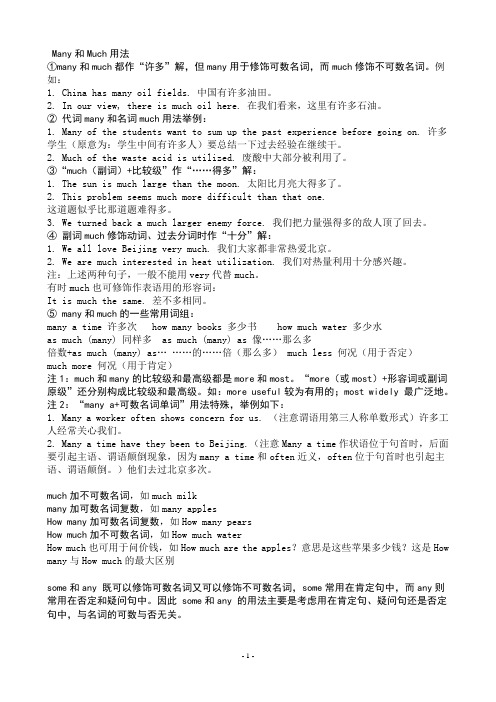
Many和Much用法①many和much都作“许多”解,但many用于修饰可数名词,而much修饰不可数名词。
例如:1. China has many oil fields. 中国有许多油田。
2. In our view, there is much oil here. 在我们看来,这里有许多石油。
②代词many和名词much用法举例:1. Many of the students want to sum up the past experience before going on. 许多学生(原意为:学生中间有许多人)要总结一下过去经验在继续干。
2. Much of the waste acid is utilized. 废酸中大部分被利用了。
③“much(副词)+比较级”作“……得多”解:1. The sun is much large than the moon. 太阳比月亮大得多了。
2. This problem seems much more difficult than that one.这道题似乎比那道题难得多。
3. We turned back a much larger enemy force. 我们把力量强得多的敌人顶了回去。
④副词much修饰动词、过去分词时作“十分”解:1. We all love Beijing very much. 我们大家都非常热爱北京。
2. We are much interested in heat utilization. 我们对热量利用十分感兴趣。
注:上述两种句子,一般不能用very代替much。
有时much也可修饰作表语用的形容词:It is much the same. 差不多相同。
⑤ many和much的一些常用词组:many a time 许多次 how many books 多少书 how much water 多少水as much (many) 同样多 as much (many) as 像……那么多倍数+as much (many) as………的……倍(那么多) much less 何况(用于否定)much more 何况(用于肯定)注1:much和many的比较级和最高级都是more和most。
much和many的用法
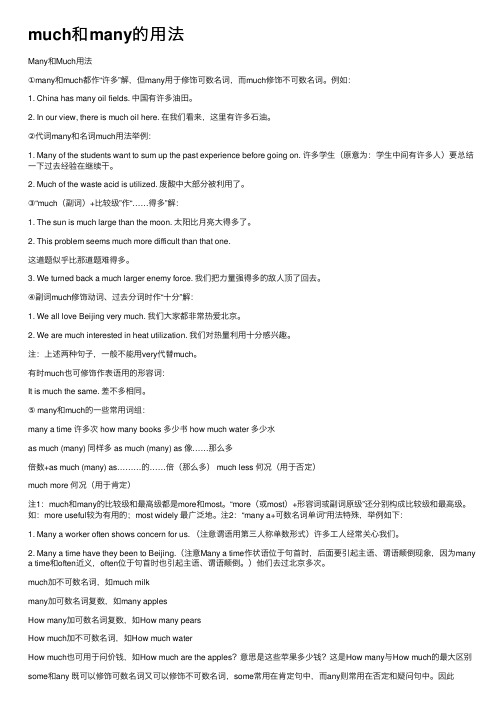
much和many的⽤法Many和Much⽤法①many和much都作“许多”解,但many⽤于修饰可数名词,⽽much修饰不可数名词。
例如:1. China has many oil fields. 中国有许多油⽥。
2. In our view, there is much oil here. 在我们看来,这⾥有许多⽯油。
②代词many和名词much⽤法举例:1. Many of the students want to sum up the past experience before going on. 许多学⽣(原意为:学⽣中间有许多⼈)要总结⼀下过去经验在继续⼲。
2. Much of the waste acid is utilized. 废酸中⼤部分被利⽤了。
③“much(副词)+⽐较级”作“……得多”解:1. The sun is much large than the moon. 太阳⽐⽉亮⼤得多了。
2. This problem seems much more difficult than that one.这道题似乎⽐那道题难得多。
3. We turned back a much larger enemy force. 我们把⼒量强得多的敌⼈顶了回去。
④副词much修饰动词、过去分词时作“⼗分”解:1. We all love Beijing very much. 我们⼤家都⾮常热爱北京。
2. We are much interested in heat utilization. 我们对热量利⽤⼗分感兴趣。
注:上述两种句⼦,⼀般不能⽤very代替much。
有时much也可修饰作表语⽤的形容词:It is much the same. 差不多相同。
⑤ many和much的⼀些常⽤词组:many a time 许多次 how many books 多少书 how much water 多少⽔as much (many) 同样多 as much (many) as 像……那么多倍数+as much (many) as………的……倍(那么多) much less 何况(⽤于否定)much more 何况(⽤于肯定)注1:much和many的⽐较级和最⾼级都是more和most。
many与much的若干用法
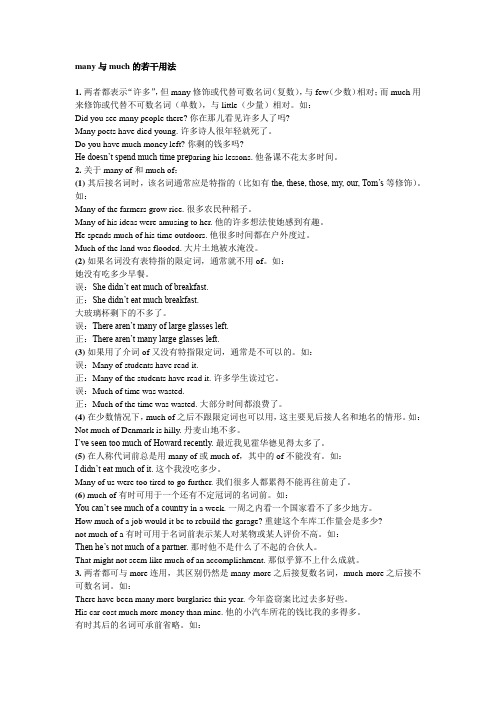
many与much的若干用法1.两者都表示“许多”,但 many 修饰或代替可数名词(复数),与 few(少数)相对;而 much 用来修饰或代替不可数名词(单数),与little(少量)相对。
如:Did you see many people there? 你在那儿看见许多人了吗?Many poets have died young. 许多诗人很年轻就死了。
Do you have much money left? 你剩的钱多吗?He doesn’t spend much time prep aring his lessons. 他备课不花太多时间。
2.关于many of 和 much of:(1) 其后接名词时,该名词通常应是特指的(比如有the, these, those, my, our, Tom’s等修饰)。
如:Many of the farmers grow rice. 很多农民种稻子。
Many of his ideas were amusing to her. 他的许多想法使她感到有趣。
He spends much of his time outdoors. 他很多时间都在户外度过。
Much of the land was flooded. 大片土地被水淹没。
(2) 如果名词没有表特指的限定词,通常就不用of。
如:她没有吃多少早餐。
误:She didn’t eat much of breakfast.正:She didn’t eat much breakfast.大玻璃杯剩下的不多了。
误:There aren’t many of large glasses left.正:There aren’t many large glasses left.(3) 如果用了介词of又没有特指限定词,通常是不可以的。
如:误:Many of students have read it.正:Many of the students have read it. 许多学生读过它。
高中英语 Unit5 形容词 I语法考点超级归纳素材-人教版高中全册英语素材
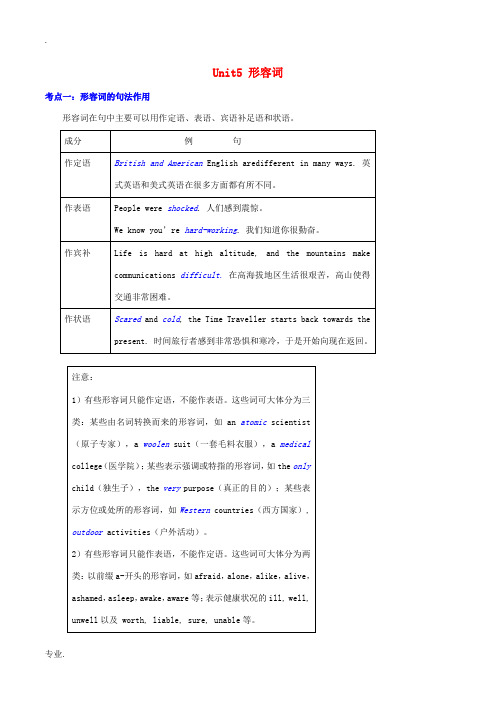
Unit5 形容词考点一:形容词的句法作用形容词在句中主要可以用作定语、表语、宾语补足语和状语。
考点二:多个形容词的排列顺序形容词作定语通常放在所修饰的名词前,若有几个形容词,一般则按照以下顺序排列:限定词→数词→描绘词(大小,长短,形状,新旧,颜色)→出处(国籍,产地)→材料→用途→名词a small round table 一张小圆桌子a dirty old red skirt 一条脏的旧红裙子a fine little old stone bridge 一座漂亮的古老小石桥ten large black plastic bags 十只黑色的大塑料袋the first Chinese astronaut 第一个中国宇航员such a pretty little wooden garden chair 这么漂亮的花园用的小木椅子考点四:形容词的比较级和最高级形容词有三个等级:原级、比较级和最高级,统称为“比较等级”。
1. 形容词比较级和最高级的构成(1)规则形式单音节形容词和少数双音节形容词是在原级后加-er,-est构成,多音节和其他双音节词是在词前加more, most构成。
构成方式见下表:注意:1)glad, fond, tired, pleased, shy等单音节词,常在词前加more和most构成比较级和最高级,如:more glad / pleased; most glad / pleased。
2)less和least也可用来构成比较等级,表示“较不…”和“最不…”,如less dangerous(较不危险的),least dangerous(最不危险的)。
(2)不规则形式英语里有些形容词的比较级和最高级是不规则的,需要逐个记忆,详见下表:注:1)few常用规则的比较等级fewer和fewest,但在当代英语里也可以用less和least。
2) elder和eldest在英国英语里表示年长关系,而美国英语却用older 和oldest。
中考英语常见副词形容词比较级最高级单词归纳总结

中考英语常见副词形容词比较级最高级单词归纳总结一、目录1.中考英语常见副词形容词比较级最高级单词归纳总结2.不规则变化词比较级最高级3.特殊用法比较级最高级4.常用句型总结5.易混淆词汇辨析6.语法考点解析二、中考英语常见副词形容词比较级最高级单词归纳总结1.副词比较级最高级:more,most;less,least;fairly,quite;hardly,scarcely;again,once more;fast,faster,fastest;early,earlier,earliest;high,higher,highest;late,later,latest;near,nearer,nearest等。
2.形容词比较级最高级:big,bigger,biggest;small,smaller,smallest;hot,hotter,hottest;red,redder,reddest;beautiful,more beautiful,most beautiful等。
3.不规则变化词比较级最高级:good,better,best;badly,worse,worst;many,more,most等。
4.特殊用法比较级最高级:as...as中间用形容词或副词原级;the+比较级+ofthe two/in the pair表示两者中比较...的一个;the+序数词+比较级表示第几...等。
三、常用句型总结1.The+比较级...,the+比较级...越...越...2.比较级+than+any other+单数名词/any of+复数名词/any+单数名词表示最高级的含义。
3.比较级+than+the other+单数名词/the other+复数名词表示比较级的含义。
4.比较级+than+同一主语的其他动词表示比较级的含义。
5.The+比较级+主语+谓语表示比较级的特殊用法。
四、易混淆词汇辨析1.more和many的区别:more修饰可数名词复数或不可数名词,表示更多;many修饰可数名词复数。
manymoremuchmore区别
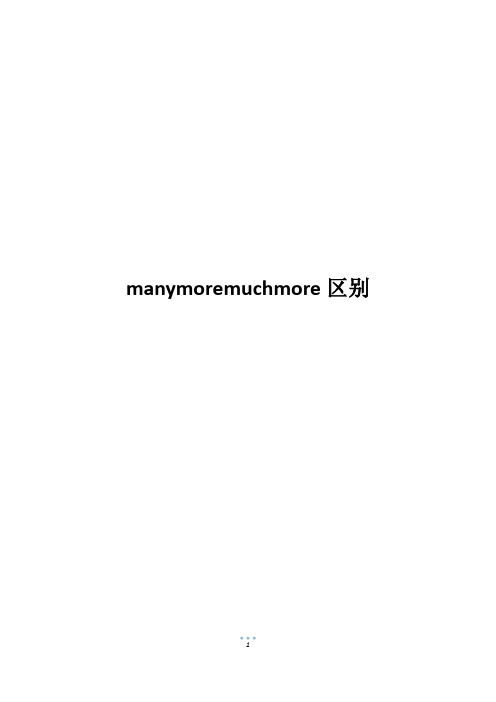
manymoremuchmore区别many more much more 区别:many more后加可数名词复数形式,若不加名词,则more本身就表示复数概念,其次many more不可修饰形容词和副词;much more后加不可数名词,若不加名词,则more本身就表示不可数名词,且much more 可以修饰形容词和副词。
一、many more的基本释义及用法介绍1、many more有更多、更多的、多人多等含义。
2、many more后接名词,且是复数可数名词;不接名词,则more本身就被看作是一个复数名词,表示复数概念。
例如:Some students are against the plan, but many more (students) support it.一些同学反对这项计划,但是有更多人支持它。
二、much more的基本释义及用法介绍1、much more有更、何况等含义。
2、much more后面可接不可数名词,若不接名词,则more 本身就被看作是一个不可数名词。
例如:It is difficult to understand his books, much more his lectures.他写的书很难懂,他的讲演就更难懂了。
Contractions are much more common in speech than in writing. 缩略词在口语里比在书写中常见得多。
3、much more可以修饰形容词和副词。
例如:It was much more enjoyable than I had expected.这比我预期的有趣得多。
I found English much more difficult to learn.我发现英语难学得多。
Possibly, much more than you know.可能比你知道的更加重要。
many much more most的用法和区别
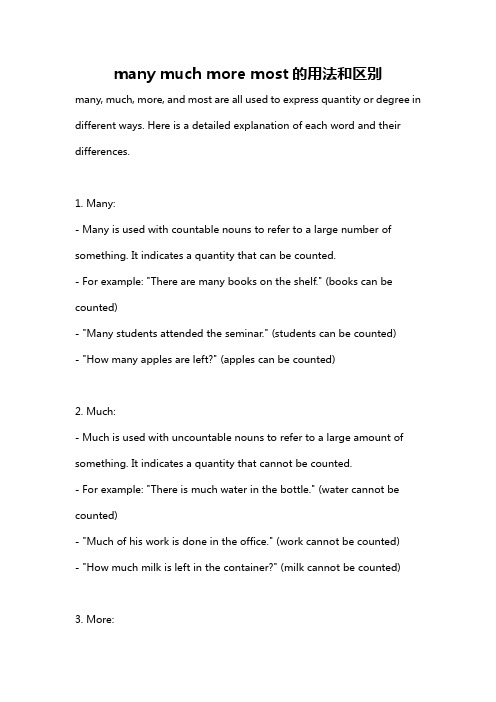
many much more most的用法和区别many, much, more, and most are all used to express quantity or degree in different ways. Here is a detailed explanation of each word and their differences.1. Many:- Many is used with countable nouns to refer to a large number of something. It indicates a quantity that can be counted.- For example: "There are many books on the shelf." (books can be counted)- "Many students attended the seminar." (students can be counted)- "How many apples are left?" (apples can be counted)2. Much:- Much is used with uncountable nouns to refer to a large amount of something. It indicates a quantity that cannot be counted.- For example: "There is much water in the bottle." (water cannot be counted)- "Much of his work is done in the office." (work cannot be counted)- "How much milk is left in the container?" (milk cannot be counted)3. More:- More is used to compare two quantities or degrees. It indicates an increase or addition to what already exists.- For example: "She wants more candy than her sister." (comparing quantities of candy)- "He earns more money than his coworkers." (comparing amounts of money)- "We need more time to finish the project." (referring to an additional amount of time)4. Most:- Most is used to refer to the highest degree or quantity of something. It indicates a large majority or the greatest extent.- For example: "Most people prefer chocolate over vanilla." (referring to the majority of people)- "He is the most talented athlete on the team." (referring to the highest degree of talent)- "She spends most of her time studying." (referring to the greatest extent of time)Now let's compare the differences between these words in more detail:1. Countable vs. Uncountable:- Many is used with countable nouns, while much is used with uncountable nouns.- Countable nouns are things that can be counted individually, such as books, students, or apples.- Uncountable nouns are things that cannot be counted individually, such as water, work, or milk.2. Quantity vs. Degree:- Many and much are used to indicate quantity or amount, while more and most are used to indicate a higher degree or additional quantity.- Many and much focus on the specific number or amount, while more and most focus on comparing or increasing what already exists.3. Comparative vs. Superlative:- More is used to compare two quantities or degrees, while most is used to refer to the greatest extent or highest degree.- More is used when comparing two things, while most is used when there are more than two things and one stands out as the highest or greatest.4. Context and Usage:- Many and much are more commonly used in affirmative statements,questions, and negative statements.- More and most are used in comparative statements, superlative statements, and to show an increase or addition.In conclusion, many, much, more, and most are used to express quantity or degree in different ways. Many is used with countable nouns, much is used with uncountable nouns, more is used to compare, and most is used to refer to the highest degree or majority. The choice of word depends on the noun being used, the context, and the intended meaning.。
many-more与much-more的区别
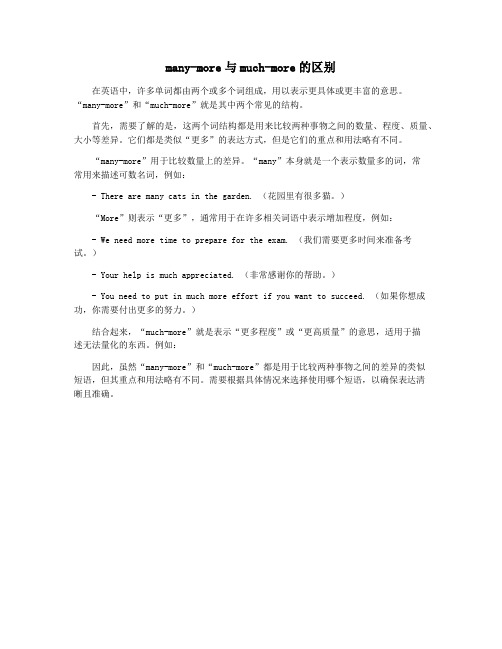
many-more与much-more的区别
在英语中,许多单词都由两个或多个词组成,用以表示更具体或更丰富的意思。
“many-more”和“much-more”就是其中两个常见的结构。
首先,需要了解的是,这两个词结构都是用来比较两种事物之间的数量、程度、质量、大小等差异。
它们都是类似“更多”的表达方式,但是它们的重点和用法略有不同。
“many-more”用于比较数量上的差异。
“many”本身就是一个表示数量多的词,常
常用来描述可数名词,例如:
- There are many cats in the garden. (花园里有很多猫。
)
“More”则表示“更多”,通常用于在许多相关词语中表示增加程度,例如:
- We need more time to prepare for the exam. (我们需要更多时间来准备考试。
)
- Your help is much appreciated. (非常感谢你的帮助。
)
- You need to put in much more effort if you want to succeed. (如果你想成功,你需要付出更多的努力。
)
结合起来,“much-more”就是表示“更多程度”或“更高质量”的意思,适用于描
述无法量化的东西。
例如:
因此,虽然“many-more”和“much-more”都是用于比较两种事物之间的差异的类似
短语,但其重点和用法略有不同。
需要根据具体情况来选择使用哪个短语,以确保表达清
晰且准确。
many的比较级和最高级
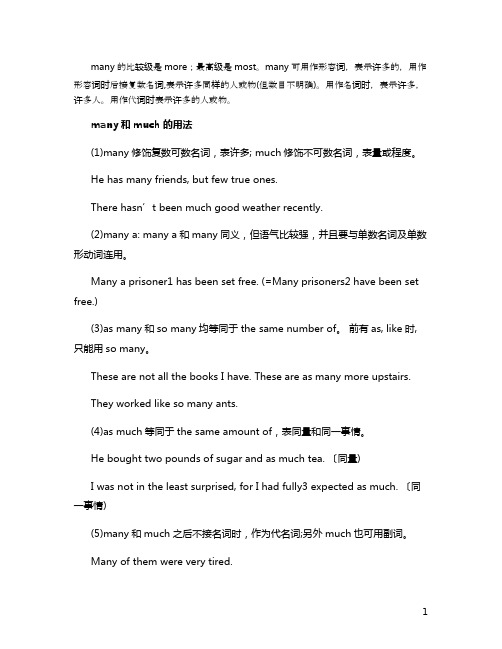
many的比较级是more;最高级是most。
many可用作形容词,表示许多的,用作形容词时后接复数名词,表示许多同样的人或物(但数目不明确)。
用作名词时,表示许多,许多人。
用作代词时表示许多的人或物。
many和much的用法(1)many修饰复数可数名词,表许多; much修饰不可数名词,表量或程度。
He has many friends, but few true ones.There hasn’t been much good weather recently.(2)many a: many a和many同义,但语气比较强,并且要与单数名词及单数形动词连用。
Many a prisoner1 has been set free. (=Many prisoners2 have been set free.)(3)as many和so many均等同于the same number of。
前有as, like时, 只能用so many。
These are not all the books I have. These are as many more upstairs.They worked like so many ants.(4)as much等同于the same amount of,表同量和同一事情。
He bought two pounds of sugar and as much tea. 〔同量)I was not in the least surprised, for I had fully3 expected as much. 〔同一事情)(5)many和much之后不接名词时,作为代名词;另外much也可用副词。
Many of them were very tired.I don’t eat much for lunch. 〔代名词)He is much taller than I. (副词〕扩展:表示“许多”的词组的对比分析(1) plenty of, a lot of, lots of均表“许多”,修饰复数可数名词或不可数名词。
more的用法
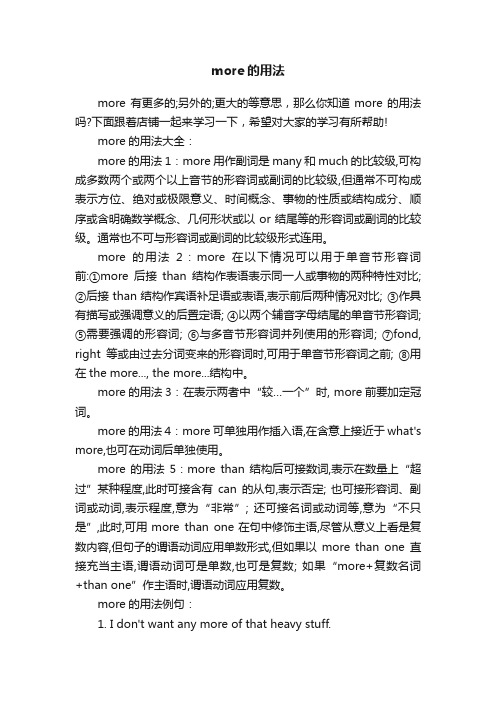
more的用法more有更多的;另外的;更大的等意思,那么你知道more的用法吗?下面跟着店铺一起来学习一下,希望对大家的学习有所帮助!more的用法大全:more的用法1:more用作副词是many和much的比较级,可构成多数两个或两个以上音节的形容词或副词的比较级,但通常不可构成表示方位、绝对或极限意义、时间概念、事物的性质或结构成分、顺序或含明确数学概念、几何形状或以or结尾等的形容词或副词的比较级。
通常也不可与形容词或副词的比较级形式连用。
more的用法2:more在以下情况可以用于单音节形容词前:①more后接than结构作表语表示同一人或事物的两种特性对比;②后接than结构作宾语补足语或表语,表示前后两种情况对比; ③作具有描写或强调意义的后置定语; ④以两个辅音字母结尾的单音节形容词;⑤需要强调的形容词; ⑥与多音节形容词并列使用的形容词; ⑦fon d, right等或由过去分词变来的形容词时,可用于单音节形容词之前; ⑧用在the more..., the more...结构中。
more的用法3:在表示两者中“较…一个”时, more前要加定冠词。
more的用法4:more可单独用作插入语,在含意上接近于what's more,也可在动词后单独使用。
more的用法5:more than结构后可接数词,表示在数量上“超过”某种程度,此时可接含有can的从句,表示否定; 也可接形容词、副词或动词,表示程度,意为“非常”; 还可接名词或动词等,意为“不只是”,此时,可用more than one在句中修饰主语,尽管从意义上看是复数内容,但句子的谓语动词应用单数形式,但如果以more than one直接充当主语,谓语动词可是单数,也可是复数; 如果“more+复数名词+than one”作主语时,谓语动词应用复数。
more的用法例句:1. I don't want any more of that heavy stuff.我再也不想碰那种麻烦事了。
much和many的区别
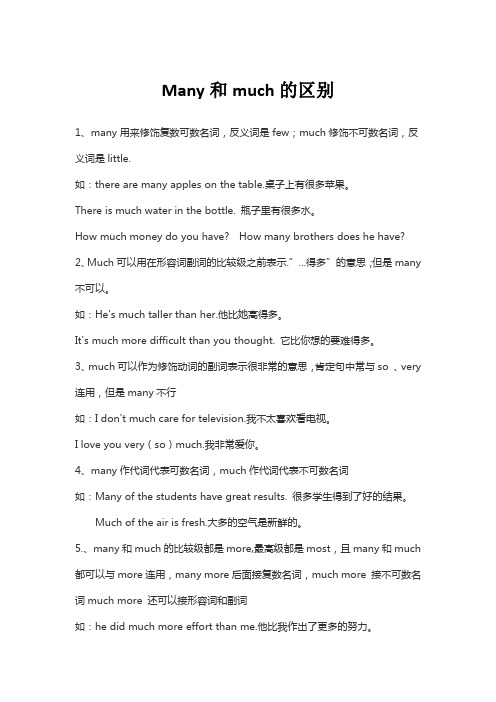
Many和much的区别1、many用来修饰复数可数名词,反义词是few;much修饰不可数名词,反义词是little.如:there are many apples on the table.桌子上有很多苹果。
There is much water in the bottle. 瓶子里有很多水。
How much money do you have? How many brothers does he have?2、Much可以用在形容词副词的比较级之前表示.”...得多”的意思;但是many 不可以。
如:He's much taller than her.他比她高得多。
It's much more difficult than you thought. 它比你想的要难得多。
3、much可以作为修饰动词的副词表示很非常的意思,肯定句中常与so 、very 连用,但是many不行如:I don't much care for television.我不太喜欢看电视。
I love you very(so)much.我非常爱你。
4、many作代词代表可数名词,much作代词代表不可数名词如:Many of the students have great results. 很多学生得到了好的结果。
Much of the air is fresh.大多的空气是新鲜的。
5.、many和much的比较级都是more,最高级都是most,且many和much 都可以与more连用,many more后面接复数名词,much more 接不可数名词much more 还可以接形容词和副词如:he did much more effort than me.他比我作出了更多的努力。
The rich get many more benifits from the govenment in western countries. 在西方国家,有钱人从政府获益多得多。
2019-2020-初中英语中many more 与much more的 区别-word范文 (1页)
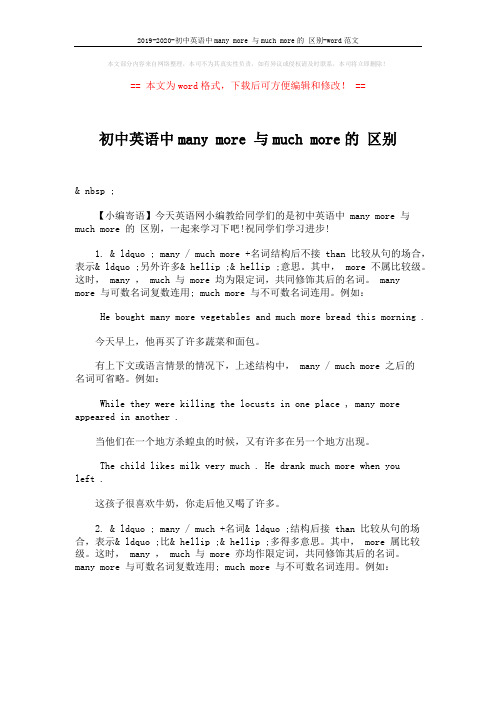
2019-2020-初中英语中many more 与much more的区别-word范文本文部分内容来自网络整理,本司不为其真实性负责,如有异议或侵权请及时联系,本司将立即删除!== 本文为word格式,下载后可方便编辑和修改! == 初中英语中many more 与much more的区别& nbsp ;【小编寄语】今天英语网小编教给同学们的是初中英语中 many more 与much more 的区别,一起来学习下吧!祝同学们学习进步!1. & ldquo ; many / much more +名词结构后不接 than 比较从句的场合,表示& ldquo ;另外许多& hellip ;& hellip ;意思。
其中, more 不属比较级。
这时, many , much 与 more 均为限定词,共同修饰其后的名词。
manymore 与可数名词复数连用; much more 与不可数名词连用。
例如:He bought many more vegetables and much more bread this morning .今天早上,他再买了许多蔬菜和面包。
有上下文或语言情景的情况下,上述结构中, many / much more 之后的名词可省略。
例如:While they were killing the locusts in one place , many more appeared in another .当他们在一个地方杀蝗虫的时候,又有许多在另一个地方出现。
The child likes milk very much . He drank much more when youleft .这孩子很喜欢牛奶,你走后他又喝了许多。
2. & ldquo ; many / much +名词& ldquo ;结构后接 than 比较从句的场合,表示& ldquo ;比& hellip ;& hellip ;多得多意思。
- 1、下载文档前请自行甄别文档内容的完整性,平台不提供额外的编辑、内容补充、找答案等附加服务。
- 2、"仅部分预览"的文档,不可在线预览部分如存在完整性等问题,可反馈申请退款(可完整预览的文档不适用该条件!)。
- 3、如文档侵犯您的权益,请联系客服反馈,我们会尽快为您处理(人工客服工作时间:9:00-18:30)。
[2]
many more 后接一个名词一定是个复数可数名词。若不接名词,则 more 本身就被看作是一个复数名词,表示复数概念。eg.
①Some students are against the plan, but many more support it. 一些同学反 对这项计划,但是有更多人支持它。
many more 与 much more 的区别:
[1]
much 修饰 more 只是一种用法。如果不是一定把它们都当成固定词组,而可以是单词的组合的话,它们的用法有区别。
many more 本身不是一个整体。比如“many more people”就是很多其他的人、更多的人这种意思。它的后面加上可数名词复数,实际上是这样一种用法: ◆◆more 可以置于数词或者 any,some,no,a few,a little,many,much 的后面,表示另外的、附加的、超过的。
② We have many re left. 我们还剩下很多。
much more 后接一个名词,这个名词一定是个不可数名词。若不接名词,则 more 本身就被看作是一个不可数名词。如:
①The farmers have produced much more rice. 这些农夫收了更多的稻谷。
much more 的意思比较丰富,它后面加的是不可数名词。除了与 many more 一样也有上述用法外,它还可以作为比较级。这时,more 就是一个简单的比较级的形容词,而 much 是修饰比较级的副词,相同用法还有eg.much bigger, much hotter 等,语法结构相同。much 一样具有修饰比较级作用的还有 rather, 和 even,a little 等等。
同时,more 不仅可以单独作为比较级,而且还可以和形容词一起构成比较级, 这时的 much 就是修饰整个比较级而不是单纯修饰 much 的了。 much more 如 beautiful。但是不用把它想的太复杂,它和 more 直接作比较级时语法相同,只不过 much 后面的比较级长了一点而已。
②She has much more to do. 她还有很多事要去做。
many more 不可能修饰形容词和副词,而 much more 和 far more, even more, still more 等一样,可以修饰形容词和副词,表示“更加”。eg.
①This TV set is much more expensive. 这台电视机要贵得多。 ②He worked much more carefully on the new design. 在这项新的设计上,他工作努力得多了。
